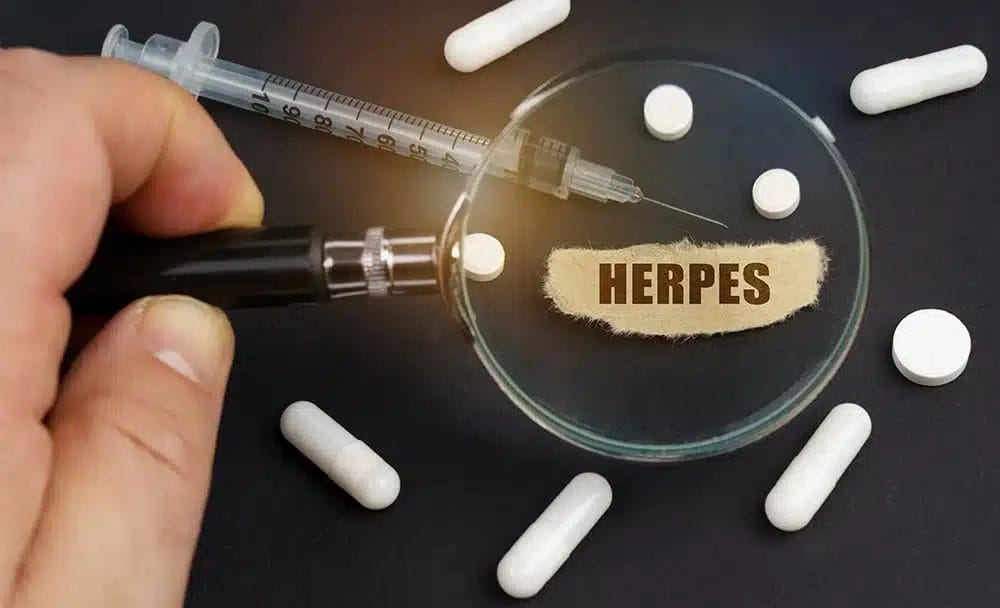This article is reviewed by Dr. HM Chandola

Herpes can refer to a number of different infections caused by different types of herpes viruses. However, it is most commonly used to refer to the sexually transmitted disease as this is not just the most widespread type of herpes infection, it is also the most common sexually transmitted disease worldwide. In India, studies indicate a prevalence of 10 percent, which means that 1 in 10 adults has sexually transmitted or genital herpes 1. In addition to genital herpes, other types of herpes can also cause cold sores (oral herpes) and infections like chickenpox or shingles. In Ayurveda, herpes is often associated with a condition called Visarpa.
Herpes Symptoms
Herpes symptoms can vary greatly depending on the type of herpes infection. In general, they can include 2:
- Tingling, itching, or burning – Before the blisters appear, the skin may tingle, itch, or burn for a day or so.
- Blisters or sores – These are the most noticeable signs of herpes. They usually form in groups on or around the mouth or genitals. They are filled with fluid and can be painful or itchy. They break open and ooze or bleed, then scab over and heal.
- Painful urination – If the blisters or sores are near the urethra, the tube that releases urine from the body, they can cause burning or difficulty peeing.
- Discharge – Some people may have discharge from the urethra or the vagina due to herpes infection.
- Flu-like symptoms – During the first outbreak of genital herpes, some people may also have fever, headache, body aches, swollen lymph nodes, or fatigue.
Not everyone who has herpes will have symptoms, or they may be very mild and go unnoticed. Symptoms usually start 2 to 20 days after exposure to the virus and last for 2 to 4 weeks. They may recur from time to time, especially when the immune system is weakened4. There is no cure for herpes, but antiviral medications can help reduce symptoms and prevent transmission to others.
Herpes Causes
HSV-1 is primarily responsible for oral herpes, typically characterized by cold sores or fever blisters around the mouth or face 3. It is commonly transmitted through direct contact with infected oral secretions, such as through kissing, sharing utensils, or touching the sores.
HSV-2, on the other hand, is responsible for genital herpes, which involves the development of sores or blisters in the genital area 4. It is usually transmitted through sexual contact with an infected person, including vaginal, anal, or oral sex.
Both types of herpes can be transmitted even when there are no visible symptoms present. The virus enters the body through breaks in the skin or mucous membranes and establishes a lifelong infection. After the initial infection, the virus remains dormant in nerve cells and can reactivate periodically, causing recurrent outbreaks.
Factors that can trigger herpes outbreaks include physical or emotional stress, illness, hormonal changes, weakened immune system, and exposure to sunlight. During an outbreak, the virus can be easily transmitted to others.
Types of Herpes
As mentioned, there are two main types of common herpes infections. These are HSV-1 and HSV-2. Here is an overview of these common herpes infections along with other conditions caused by different types of herpes viruses 5.
- HSV-1, which usually causes oral herpes or cold sores around the mouth and lips. Most adults are infected with HSV-1, but many have no symptoms or only mild ones 3.
- HSV-2, which usually causes genital herpes or blisters and sores around the genitals or anus. HSV-2 is a sexually transmitted infection (STI) that can be passed from one person to another through sexual contact 4.
- Varicella-zoster virus (VZV) causes chickenpox, which is a common childhood infection that causes itchy, red spots all over the body 6. The virus can be reactivated in adults, years or even decades later to cause shingles, which involves painful, blistering rashes on one side of the body or face.
- Epstein-Barr virus (EBV) causes infectious mononucleosis or mono, which is characterized by fever, sore throat, swollen glands and fatigue. EBV can also cause other diseases, such as Burkitt’s lymphoma and nasopharyngeal carcinoma 7.
- Cytomegalovirus (CMV) causes mild flu-like symptoms in healthy people, but can be serious in people with weakened immune systems or unborn babies 8. It can cause birth defects, hearing loss, vision loss or mental disability in infants infected before birth.
- Human herpes virus 6 (HHV-6) and human herpes virus 7 (HHV-7) are known to cause roseola infantum or sixth disease 9. Roseola is a mild infection that affects young children and causes fever and a rash on the trunk and neck.
- Human herpes virus 8 (HHV-8) or Kaposi’s sarcoma-associated herpes virus (KSHV) causes Kaposi’s sarcoma and primary effusion lymphoma 10. Kaposi’s sarcoma is a rare cancer that manifests in purple or brown lesions on the skin or mucous membranes. Primary effusion lymphoma is a rare type of lymphoma that affects the lining of body cavities.

Herpes Diagnosis
To diagnose herpes infections, your healthcare provider may:
- Look at your skin and examine any blisters or sores you have
- Take a swab or sample from a blister or sore that is not already crusted over or healing
- Perform a blood test to check for antibodies to the herpes virus
The most accurate way to diagnose herpes is by taking a swab or sample from a lesion and testing it for the presence of the virus using a viral culture test or a nucleic acid amplification test (NAT) 11. These tests can tell you which type of HSV you have and if you have an active infection.
Herpes Treatment
Here’s a brief overview of the treatment options for different types of herpes infections:
- Oral Herpes (HSV-1) 12:
- Antiviral Medications: Prescription antiviral drugs can help reduce the duration and severity of outbreaks. They are most effective when taken at the earliest sign of an outbreak.
- Over-the-Counter (OTC) Medications: Topical creams or ointments can provide temporary relief from oral herpes symptoms like pain and itching.
- Genital Herpes (HSV-2) 13:
- Antiviral Medications: Similar to oral herpes, prescription antiviral drugs are used to manage genital herpes outbreaks and can help shorten outbreak duration, reduce symptom severity and decrease the risk of transmission.
- Suppressive Therapy: For individuals experiencing frequent or severe outbreaks, daily antiviral medication may be prescribed to suppress the virus, reduce the frequency of outbreaks, and lower the risk of transmission.
- Herpes Zoster (Shingles) 6:
- Antiviral Medications: Prescription antiviral drugs can help shorten the duration of the outbreak, reduce pain and discomfort, and minimize the risk of complications.
- Pain Management: Over-the-counter pain relievers or prescription medications, including topical creams, may be used to manage the pain associated with shingles.
- Vaccination: The shingles vaccine (Shingrix) is recommended for adults aged 50 and older to prevent shingles or reduce the risk of complications.
Ayurvedic Treatment Of Herpes
With the exception of vaccines, conventional herpes treatments only aim to provide symptom relief and can also cause other side effects. This is the case with most viral infections. This is what makes natural treatments, including Ayurvedic medicines for herpes so favourable.
Ayurvedic treatment for herpes aims to balance the doshas and strengthen the immune system. This often involves a combination of herbal remedies, dietary modifications, lifestyle changes, and stress reduction techniques. Ayurvedic herbs like Shatavari, Gokshura and Lodhra are commonly used for their antiviral and immune-boosting properties 14.
In addition to the use of herbs and oral herpes medicines, Ayurvedic physicians can also administer therapies that aim to provide complete relief and prevent complications. Research has proven the efficacy of such treatments, showing that the Ayurvedic procedure of Siravedh or Jalauka relieves herpes symptoms within twelve days and can help avoid complications such as post herpetic neuralgia 15.
Conclusion
It’s important to note that while these treatment options can help manage herpes infections, medical consultation is absolutely vital for an accurate diagnosis and appropriate treatment. This is important because of the wide range of herpes infections and the high risk of transmission as well as complications. If you have any reason to believe you might have a herpes infection get tested and talk to an Ayurvedic doctor today.
FAQs
1. Can herpes symptoms be confused with other diseases?
Yes, without an accurate diagnosis, herpes symptoms can also be mistaken for diseases such as Bacterial vaginosis (BV), yeast infections, haemorrhoids and bug bites, to name a few.
2. How long can herpes live on surfaces?
Studies indicate that herpes virus particles can survive for at least three hours on clothing and four hours on plastic surfaces, posing considerable risk of transmission 16.
3. Does herpes affect nerves?
Yes, but this depends on the type of herpes virus involved. For example, HSV-1 infects the peripheral and central nervous systems, beginning with primary infection in epithelial cells, after which it reaches the peripheral nervous system to establish a latent infection.
Disclaimer: The information provided here is for general information and not meant to substitute any medical advice. Please consult your doctor for appropriate medical consultation.
References:
- https://www.cghr.org/wordpress/wp-content/uploads/Prevalence-and-corelates-of-Herpes-Simplex-Virus-2-2011.pdf
- https://www.ncbi.nlm.nih.gov/books/NBK525769/
- https://www.ncbi.nlm.nih.gov/books/NBK482197/
- https://www.cdc.gov/std/herpes/stdfact-herpes.htm
- https://www.ncbi.nlm.nih.gov/books/NBK8157/
- https://www.ncbi.nlm.nih.gov/books/NBK448191/
- https://www.ncbi.nlm.nih.gov/books/NBK559285/
- https://www.cdc.gov/cmv/overview.html
- https://www.ncbi.nlm.nih.gov/pmc/articles/PMC3538396/
- https://www.ncbi.nlm.nih.gov/books/NBK556023/
- https://www.tandfonline.com/doi/abs/10.1586/14737159.4.4.485
- https://medlineplus.gov/ency/article/000606.htm
- https://www.cdc.gov/std/herpes/treatment.htm
- https://www.ncbi.nlm.nih.gov/pmc/articles/PMC7527853/
- https://www.ijam.co.in/index.php/ijam/article/view/2871
- https://www.scirp.org/journal/paperinformation.aspx?paperid=72715
















